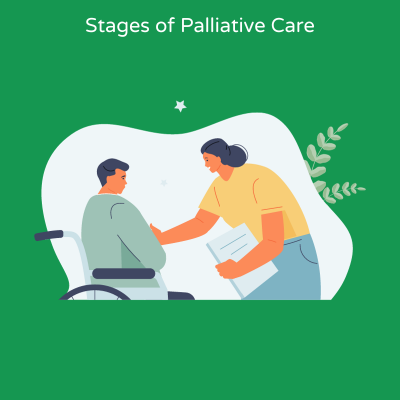-
Table of Contents
Embracing comfort and dignity in life’s final journey.
Palliative care is a specialized medical approach that focuses on providing relief from the symptoms, pain, and stress associated with serious illnesses. It aims to improve the quality of life for patients and their families by addressing physical, emotional, and spiritual needs. End-of-life planning, on the other hand, involves making decisions and arrangements for the care and treatment a person wishes to receive as they approach the end of their life. It includes discussions about medical interventions, preferences for care, and the creation of advance directives to ensure that a person’s wishes are respected.
The Importance of Palliative Care in End-of-Life Planning
Palliative care is a crucial aspect of end-of-life planning that often goes overlooked. It is a specialized form of medical care that focuses on providing relief from the symptoms and stress of a serious illness. The goal of palliative care is to improve the quality of life for both the patient and their family, by addressing physical, emotional, and spiritual needs.
One of the main reasons why palliative care is so important in end-of-life planning is that it helps to ensure that the patient’s wishes are respected and honored. By involving a palliative care team early on in the planning process, patients can have their preferences for treatment and care clearly documented. This can help to prevent any misunderstandings or disagreements among family members, and ensure that the patient’s wishes are followed.
Another reason why palliative care is crucial in end-of-life planning is that it provides support and guidance to both the patient and their family. Dealing with a serious illness and the prospect of death can be overwhelming, and having a palliative care team by your side can make a world of difference. They can help to navigate the complex medical system, provide emotional support, and offer guidance on difficult decisions.
Palliative care also plays a vital role in managing pain and other symptoms associated with a serious illness. Many patients experience physical discomfort as their condition progresses, and palliative care can help to alleviate this suffering. Through the use of medications, therapies, and other interventions, the palliative care team can help to improve the patient’s comfort and overall well-being.
In addition to managing physical symptoms, palliative care also addresses the emotional and spiritual needs of the patient. Facing the end of life can bring up a range of emotions, including fear, sadness, and anxiety. Palliative care professionals are trained to provide emotional support and counseling to both the patient and their family, helping them to navigate these difficult emotions and find peace and acceptance.
Furthermore, palliative care can help to improve communication and coordination among the various healthcare providers involved in the patient’s care. By working closely with the patient’s primary care physician, specialists, and other healthcare professionals, the palliative care team can ensure that everyone is on the same page and working towards the same goals. This can help to prevent any gaps or lapses in care, and ensure that the patient’s needs are being met.
In conclusion, palliative care is a crucial component of end-of-life planning. It helps to ensure that the patient’s wishes are respected, provides support and guidance to both the patient and their family, manages pain and other symptoms, addresses emotional and spiritual needs, and improves communication and coordination among healthcare providers. By incorporating palliative care into end-of-life planning, patients can receive the care and support they need to live their final days with dignity and comfort.
Understanding the Role of Palliative Care in Improving Quality of Life
Palliative care is a specialized medical approach that focuses on improving the quality of life for individuals facing serious illnesses. It is a holistic approach that addresses not only the physical symptoms but also the emotional, social, and spiritual needs of patients and their families. Palliative care is not limited to end-of-life care; it can be provided at any stage of a serious illness, alongside curative treatments.
The goal of palliative care is to alleviate suffering and improve the overall well-being of patients. This is achieved through a multidisciplinary team that includes doctors, nurses, social workers, chaplains, and other healthcare professionals. The team works together to develop a personalized care plan that addresses the unique needs and goals of each patient.
One of the key aspects of palliative care is pain and symptom management. The team focuses on controlling pain and other distressing symptoms such as nausea, shortness of breath, and fatigue. By effectively managing these symptoms, patients can experience a better quality of life and engage more fully in their daily activities.
In addition to physical symptoms, palliative care also addresses the emotional and psychological needs of patients. Serious illnesses can often lead to feelings of anxiety, depression, and fear. The palliative care team provides emotional support and counseling to help patients and their families cope with these difficult emotions. They also assist with advance care planning, helping patients make decisions about their future medical care and ensuring that their wishes are respected.
Another important aspect of palliative care is communication. The team facilitates open and honest discussions about the patient’s illness, prognosis, and treatment options. This helps patients and their families make informed decisions about their care and ensures that their values and preferences are taken into account. Effective communication also helps to build trust and strengthen the patient-provider relationship.
Palliative care is not just for the patient; it also extends to the family members and loved ones. The team provides support and guidance to family members, helping them navigate the challenges of caregiving and offering emotional support during this difficult time. They also assist with practical matters such as coordinating home care services and providing respite care for family caregivers.
Research has shown that palliative care can significantly improve the quality of life for patients with serious illnesses. Studies have found that patients who receive palliative care experience less pain, have better symptom control, and report higher satisfaction with their care. They also have fewer hospital readmissions and are more likely to receive appropriate end-of-life care.
In conclusion, palliative care plays a crucial role in improving the quality of life for individuals facing serious illnesses. It addresses not only the physical symptoms but also the emotional, social, and spiritual needs of patients and their families. By providing comprehensive care and support, palliative care helps patients live as fully and comfortably as possible, regardless of their prognosis. It is an essential component of healthcare that should be integrated into the care of all individuals with serious illnesses.
Exploring Different Approaches to End-of-Life Planning and Palliative Care
Palliative care and end-of-life planning are crucial aspects of healthcare that aim to provide comfort and support to individuals facing life-limiting illnesses. These approaches focus on improving the quality of life for patients and their families, ensuring that their physical, emotional, and spiritual needs are met during this challenging time.
One approach to end-of-life planning is advance care planning. This involves discussing and documenting an individual’s preferences for medical treatment and care in the event that they are unable to make decisions for themselves. Advance care planning allows individuals to have control over their healthcare decisions and ensures that their wishes are respected. It also provides peace of mind for both patients and their loved ones, knowing that their desires will be honored.
Another approach to end-of-life planning is hospice care. Hospice care is a specialized form of palliative care that focuses on providing comfort and support to individuals with a life expectancy of six months or less. Hospice care can be provided in a variety of settings, including the individual’s home, a hospice facility, or a hospital. The goal of hospice care is to manage pain and symptoms, provide emotional and spiritual support, and enhance the quality of life for patients and their families.
In addition to advance care planning and hospice care, there are other approaches to end-of-life planning and palliative care that individuals may consider. These include palliative care consultations, which involve a team of healthcare professionals working together to address the physical, emotional, and spiritual needs of patients. Palliative care consultations can be beneficial for individuals who are not yet eligible for hospice care but still require support and symptom management.
Another approach is the use of palliative care teams in hospitals and other healthcare settings. These teams consist of healthcare professionals with specialized training in palliative care who work alongside the primary medical team to provide comprehensive support to patients and their families. Palliative care teams can help manage pain and symptoms, provide emotional support, and assist with end-of-life decision-making.
It is important to note that end-of-life planning and palliative care are not just for individuals with terminal illnesses. These approaches can also be beneficial for individuals with chronic illnesses or conditions that may impact their quality of life. By incorporating palliative care into their treatment plans, individuals can receive the support they need to manage symptoms, improve their overall well-being, and make informed decisions about their healthcare.
In conclusion, end-of-life planning and palliative care are essential components of healthcare that aim to provide comfort, support, and improved quality of life for individuals facing life-limiting illnesses. Approaches such as advance care planning, hospice care, palliative care consultations, and the use of palliative care teams can all play a significant role in ensuring that patients and their families receive the physical, emotional, and spiritual support they need during this challenging time. By exploring and implementing these different approaches, individuals can have greater control over their healthcare decisions and experience a higher quality of life during their final stages of life.In conclusion, palliative care and end-of-life planning are crucial aspects of healthcare that aim to improve the quality of life for individuals with serious illnesses and their families. Palliative care focuses on providing relief from pain and other distressing symptoms, while end-of-life planning involves making decisions about medical treatments, preferences, and goals for care. By integrating these approaches into healthcare systems, individuals can receive compassionate and personalized care that aligns with their values and wishes, ensuring a dignified and comfortable end-of-life experience.





